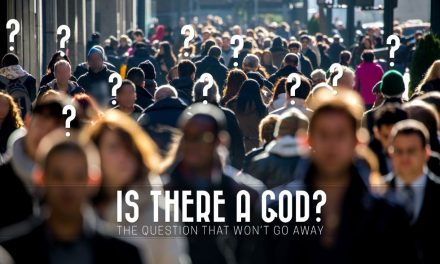by Luke Wayne
28/04/16
The moral argument for the existence of God is the argument that God is necessary for objective moral values or duties to exist. Since objective moral values and duties do exist, God must also exist. The argument is not claiming that people who don’t believe in God cannot do kind things or that atheists are generally morally worse people that religious people are. The argument is claiming that the only reason such kind actions can be thought of as truly being morally good in any real or objective sense is that the atheist is wrong about God. Such actions are objectively good because God actually does exist, even if the atheist doesn’t believe He exists. Just as those who deny germs exists can still get sick because germs really do exist, those who deny God exists can still do good things because God really does exist, and so a real standard of good does exist to make “doing good” possible.
The Moral Argument
The argument is a very simple one, and can be structured something like this:
- For an objective moral standard to exist, God must exist
- An objective moral standard does exist
- Therefore, God exists
Some Christians have found it helpful to structure the argument in the negative form1:
- If God does not exist, objective moral values and duties do not exist
- Objective moral values and duties do exist
- Therefore God exists
Both of these forms are essentially the same argument. Objective moral values and duties cannot exist without God. To deny God, one must also give up the idea that anything is actually right or wrong in any real sense.
Objections
The primary objection to this argument is to claim that objective moral values don’t actually exist. The atheist can claim that morality is a social construct. It is a useful human tool, a necessary social device that makes society possible, but there is nothing objective or real about morality beyond what we make it. Nothing is actually good or evil, these are merely subjective human judgments. This, however, is a radical claim that no one should take too seriously. In a sense, or course, we cannot prove that objective moral values do exist. In the same sense we cannot prove that external reality outside our own minds exists. Every sense and experience we have tells us that there is a real, physical world in which we live. If someone were to come up and tell you that this was actually untrue and that the world was all an illusion, perhaps that you were trapped in a dream, how would you prove them wrong? The fact that is all seemsvery real doesn’t prove anything as a dream or illusions could also seem very real. Even more, if there is no actual real, what would be your frame of reference to call something real? Yet it is perfectly rational to conclude that the world really does exist. Even those who would try and deny this must live as if it is true.
In the same way, everything sense and experience we have tells us that some things really are good and other things really are bad. We are as certain that there are real virtues, evils, and injustices as we are that there are real rocks, trees, and other human beings. In fact, we are more certain. Imagine for a moment that a man realized that all of life really was just a dream. Now imagine this man’s reaction to this was to rush out into his dream world and begin raping all the women and bashing all the children’s heads against the pavement. Something would be seriously wrong with such a person. We can imagine physical reality being an illusion, but even then it is unimaginable that moral reality is an illusion! When we meet someone who actually live like there is no morality at all, we call this person a sociopath and recognize this as a serious defect. They are failing to perceive an important element of reality just as the blind or deaf person fails to perceive an important element of physical reality, and we rightly understand sociopathy to be a far greater defect than mere physical blindness or deafness.
Many will point out that different cultures have different moralities and claim that this is evidence that objective morality does not exist and that it is just a cultural construct. Some have very convincing rebutted that, behind the differing expressions, there is actually a core of universal moral principles that all cultures really do live by. Even if this is not the case, however, the objection is not logically valid. Many cultures around the world have fundamentally ideas of why people get sick, but that does not make germ theory invalid nor render the cause of sickness to be a mere social construct. The fact that many cultures today still do not believe in germs, and that most cultures throughout history did not, doesn’t change the fact that germs exist and that they cause sickness. In the same way, just because a bunch of cultures get morality partially or even wholly wrong does not mean that morality does not exist. Morality is very real, and most all of us are actually quite sure of it. This is the rational position.
The other major objection is that morality can exist on its own without God. Things like rape and murder are really wrong whether God exists or not. The problem is that there is no clear reason why this would be so. Biology cannot ground it. If morality is a mere instinct, then it is not objective. Morality is reduced back to mere human perception than can be changed or even done away with entirely. Morality also distinguishes humans from animals in a way mere biology cannot explain. A trout that eats another trout’s young is not evil, but a man who eats his neighbors daughter is very evil. Morality is also not a physical law. Morality does not operate on a mere system of actions and reactions. Murder is wrong even if you get the results you want from doing it with no adverse effects, and if there is no divine judgment after this life, then there are people who really do literally get away with murder. Moral actions do not display the measurable system of causes and effects that physical laws do. Even if one puts forward an impersonal, unconscious moral force or principle like the eastern concept of Karma, it falls short of the goal. Buddhists are quite clear that Karma does not actually represent objective morality and must not be thought of that way. It is not about moral right and wrong, but about mere cause and effect and getting the results you want. On Karma, rape and murder are not morally wrong, they are just unhelpful if your goal is enlightenment and escaping the cycle of death and rebirth. There simply is no rational ground that has ever been offered for real, objective morality outside of a personal God.
Strengths of the argument
The moral argument appeals not only to the rational mind but to the moral conviction in the soul of a man. It speaks more to the whole person than many merely intellectual arguments do. It also intimately connects believing in God with moral judgment and God’s justice, which connects more readily to the gospel than most other arguments. The argument is also simple and easy to remember and to explain, making it accessible to most Christians.
Weaknesses of the Argument
Because the existence of morality is obviously not provable, the argument can be rejected out-of-hand without being properly considered, regardless of how obvious it is that objective morality exists. It also suffers from the fact that, while no rational ground for objective moral values and duties besides God has ever been thought of, that does not automatically mean that one does not exist that we have not yet thought of. This, too, can be used to reject the argument in blind faith that there is still a different foundation for morality yet to be found.
- 1.William Lane Craig, Reasonable Faith: Third Edition (Crossway Books, 2008) 172











